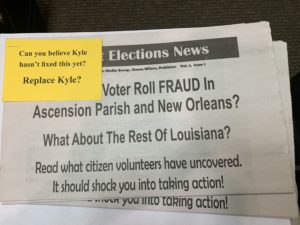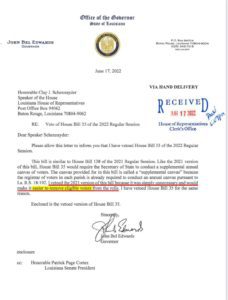The inability of Maricopa County, Arizona, to address their own election inadequacies from 2020 and 2022 has created ripples reaching all the way into Louisiana. A throng of reinvigorated activists, bursting with unstudied opinions, have projected their ire onto Louisiana; home to one of the most efficient and highly regarded election systems in the entire nation.
Suddenly, it seems, a handful of election integrity ‘experts’ are popping up everywhere. Unfortunately many of these self-identified ‘defenders of liberty’ prefer shortcuts to the real work of gaining understanding. All of their writings, no matter how compelling, are based on how they believe things might work, not on how things actually work. What makes them easy to spot is the complete lack of documented source material.
In these last few months, close observers have noticed a shift. What used to be a focus on improving our election systems has morphed into opposing a specific candidate for public office. Empowered with this knowledge, and a little attentiveness, you’ll begin to detect that thread running through their every action.
Louisiana is not using Ballot Marking Devices (BMDs)
As Mark Twain once quipped, it is wiser to find out than suppose. However, a recent article on the gateway pundit by a Baton Rouge area activist supposes that Louisiana is already exclusively using Ballot Marking Devices (BMDs) in our elections.
[Dr. Alex] Haldeman testified before Louisiana Secretary of State Kyle Ardoin’s voting Commission in late December 2021 about the gaping vulnerabilities of electronic Ballot Marking Devices (BMDs) used to record votes in Louisiana and many other states.
However, there is not, and has never been, a single BMD in use in any Louisiana election. That’s right: not even one. Louisiana uses something called Direct Recording Equipment (DRE) in both early and election day voting. This means that neither the iPad style device for early voting nor the antiquated election day machine records a ballot for each individual voter. What it does do is count how many voted and for which items. Think of it as a little odometer for every candidate or proposition on the ballot. Every time someone votes, it just adds a one to that item.
Dr. Halderman’s actual recommendation
When he was presenting to the voting systems commission, Dr. Halderman did say that the best insurance for secure elections is hand-marking a paper ballot. Using this method, it’s more possible for an individual voter’s intent to be determined in the event of an election audit or recount.
However, Dr. Halderman also said that using paper ballots in an election will ultimately require some use of BMDs. This is because not every eligible voter is able-bodied. If someone is unable to grasp a pen or to see the ballot, how can they be reasonably expected to vote in absolute privacy? The answer is simply to assist such voters using the technology we have readily available. That technology is called a BMD – Ballot Marking Device.
Are BMD’s really unsafe?
The article’s author goes on:
Haldeman is on record stating that the machines can be hacked, that he himself has repeatedly hacked into them, that it is only a matter of time before they will be hacked by bad actors, and that the machines do not have to be connected to the internet in order to be hacked.
Ardoin has no grounds to claim plausible ignorance on this issue. His continued failure to take concrete steps to convert to a secure, fully auditable hand-marked paper ballot system, no matter the cost or inconvenience, is inexcusable.
… As long as BMDs remain the primary mechanism of recording our votes, there is simply no way that Ardoin can credibly claim that our system is safe.
… If he continues to falsely claim that voters can be confident in our current system, and fails to publicly commit to doing whatever is necessary to kick BMDs to the curb once and for all, he will lose and he should lose [his reelection].
As a member of the Voting Systems Commission, I was present and attentive during the entire process. That includes Dr. Halderman’s presentation and his testimony. He said that using BMDs exclusively is not recommended because they are computers and computers can be hacked. “Exclusivity” is what would put a big target on the state’s election system, not BMDs. Instead, Halderman recommended that about five-percent (5%) of voters be encouraged to use BMDs. That would allow votes cast by the disabled to be completely private while also limiting any potential risk associated with the technology.
Additionally, the Secretary of State has made no directive, decision, or guidance on the percentages of BMDs that may be used in a future election versus hand-marking of ballots. To suggest that we will (or already do) have a 100% BMD system is categorically false. The voting systems commission (and Secretary of State, Kyle Ardoin himself) clearly wanted hand-marked paper ballots. We know this because that’s exactly what we approved. That system also includes a BMD option for the elderly, disabled, and curious.
What’s taking so long?
Some have argued that Kyle Ardoin is not moving fast enough. However, be reminded that he has effectively been trying to replace our aged voting machines for years. He tried back in 2018, when ES&S sued to block it. Then again in 2021, when John Bel Edwards blocked the attempt due to another vendor complaint; this time from Hart InterCivic.
Enter the Voting Systems Commission. In practice, the VSC was created to make the process more intentional. It slowed things down and allowed for voluminous public comment. The commission heard from a huge variety of election integrity hawks including Mike Lindell, election machine vendors, registrars of voters, clerks of court, secretaries of state from other states, and a large number of Louisiana citizens.
Following the voting systems commission’s last meeting, the SOS office began work on voting system standards. These standards are based on the recommendations of the commission. Once that process is complete (and it’s getting close) a Request for Proposals (RFP) will be issued. We’re still on target for the 2024 Presidential election – as Kyle Ardoin said was the goal before, during, and after the voting system commission met.
Also, as of the last Voting System Commission meeting, there were no labs capable of testing to the Election Assistance Commission (EAC) 2.0 standards. This standard is something all of the election integrity people said they wanted during public comment. The Secretary of State is not the EAC and (ethically) can’t build labs to test voting machines that would be used in Louisiana elections. And yet the mantra continues: “if Kyle Ardoin can’t do it faster, then we’ll find someone else who can.”
Why doesn’t Kyle Ardoin clean up the voter rolls?

Fliers handed out by Louisiana Citizens For Election Integrity. Is the goal to fix the election or to elect a different SOS?
This one is particularly perplexing to that election integrity activist in Baton Rouge. “The Secretary of State is the chief elections officer in Louisiana. As such, it is incumbent upon him to use the weight of his office to encourage subordinate state election officials [Registrars of Voters] to perform their duty.” Again, this is categorically false.
The Registrars of Voters (ROV) are required to perform a canvass by mail every year. If the mail is returned, they try to figure out where the voter went. If the registrar does not perform these duties, and although the SOS sits on the State Board of Elections Supervisors, at no point is he involved in the process to initiate discipline.
All of this is plainly pointed out in state law, Title 18 § 192. Vis: “No later than June thirtieth in each parish, the registrar of voters shall annually canvass the names of the registrants in all precincts in the parish.”
If the ROV does not do his or her job, Title 18 § 53 makes clear that it’s the parish governing authority who must notify the State Board of Elections Supervisors – not the Secretary of State. If the Secretary could fire ROVs willy-nilly, their job becomes politicized. Instead, the state wisely chose to have a barrier of separation between lifetime appointed ROVs and a temporally elected SOS.
We have to fix this!
Conversations very similar to this article have been going on for quite some time now. Once someone understands that Louisiana’s Secretary of State is not directly responsible to maintain the voter rolls, they insist something must be done legislatively.
The good news is we have already tried to get the Secretary of State the power to clean up the voter rolls himself. However, JBE vetoed it; not just once but twice. The first one was HB 138 in 2021, and then HB 35 again in 2022. Both bills were brought by Les Farnum. Louisiana even held a veto override session both years. However, Clay Schexnayder failed to call an override vote for these bills.
In his veto notice, JBE said that the bill would make it easier to remove voters from the rolls, which is exactly why he vetoed it.
Is the SOS censoring people?
The rumblings that CISA (or another alphabet agency) has been actively censoring citizens is no longer a conspiracy theory. Between Jill Hines’s lawsuit and Elon Musk, there’s zero doubt that the federal government has been working to silence public debate surrounding all kinds of things. However, it’s not been proven that the Louisiana Secretary of State or his office has participated in censoring anyone.
The assumptions of potential censorship come in the form of a large number (3,512 to be exact) of election agencies being members of the Center for Internet Security, a non-profit organization based in New York. Jill Hines’s lawsuit mentions the organization on page 125 of her lawsuit.
As early as June 2020, the Center for Internet Security, working with CISA, was planning a “Reporting Portal” for government officials seeking to suppress election misinformation that would allow “social media companies” to “process reports and provide timely responses, to include the removal of reported misinformation from the platform where possible.”
Our aforementioned Louisiana activist has taken this information, and that Louisiana is included on a list of 3,512 members with 35 other Secretaries of State, as proof positive that Louisiana has been censoring its citizens. As of this writing, no proof has been made available showing Louisiana’s Secretary of State, or any other of Louisiana’s agencies, has attempted to censor anyone.
Censorship: there’s no there there
Back to our fateful author:
In a move perfectly consistent with the unconstitutional suppression of American speech being mercilessly inflicted on conservatives by the federal government in reprehensible disregard for the First Amendment, the LFRW has decided the best way to promote the core, Madisonian Republican value of free expression on an issue of massive public importance is to simply crush the speech of a fellow Republican group. No alternative opinions need to apply. The LFRW has, on this issue, become effectively the Kyle Ardoin school of election integrity where his opinion, and his only, may be expressed within its walls.
That author has, once again, strongly presented a supposition as absolute proof. In an email, which I am not at liberty to share publicly, the Louisiana Federation of Republican Women (LFRW) has denied any outside involvement in their decision to not recommend their chapters host the “election integrity” presentation. The reasons given were short and specific. Members of LFRW with differing opinions were mocked, scorned, and treated with disrespect and disdain by the presentation’s disruptive supporters.
LFRW is a strong organization with their own mission. That mission does not include providing their platform, audiences, and resources to further the mission of other organizations. The same First Amendment that the author is bandying about has many facets. In addition to free speech, it also appropriately includes the freedom of association. In Boy Scouts of America v. Dale, the United States Supreme Court said that the freedom of association is also a freedom of disassociation. In other words, a private organization has a right to determine their own membership and who they allow to speak at their own meetings.
The final word
Is there room for improvement? Of course. But we aren’t Maricopa County. This is an election year where every single one of Louisiana’s state-wide elected officials (and more) is on the ballot. Rather than absorb all sorts of unstudied opinions, readers would do well to stay plugged into legitimate organizations that provide fully sourced and vetted information. For example, this article you’ve been reading is full of hyperlinks to places where you can read the documents for yourself and come to your own conclusions.
We intentionally do things this way because it’s what we expect of others. I won’t just take someone’s word for it; so why should you? That approach also adds an additional level of accountability on me. Because if I can’t even prove it to myself, then how can I expect to prove it to others?
###











